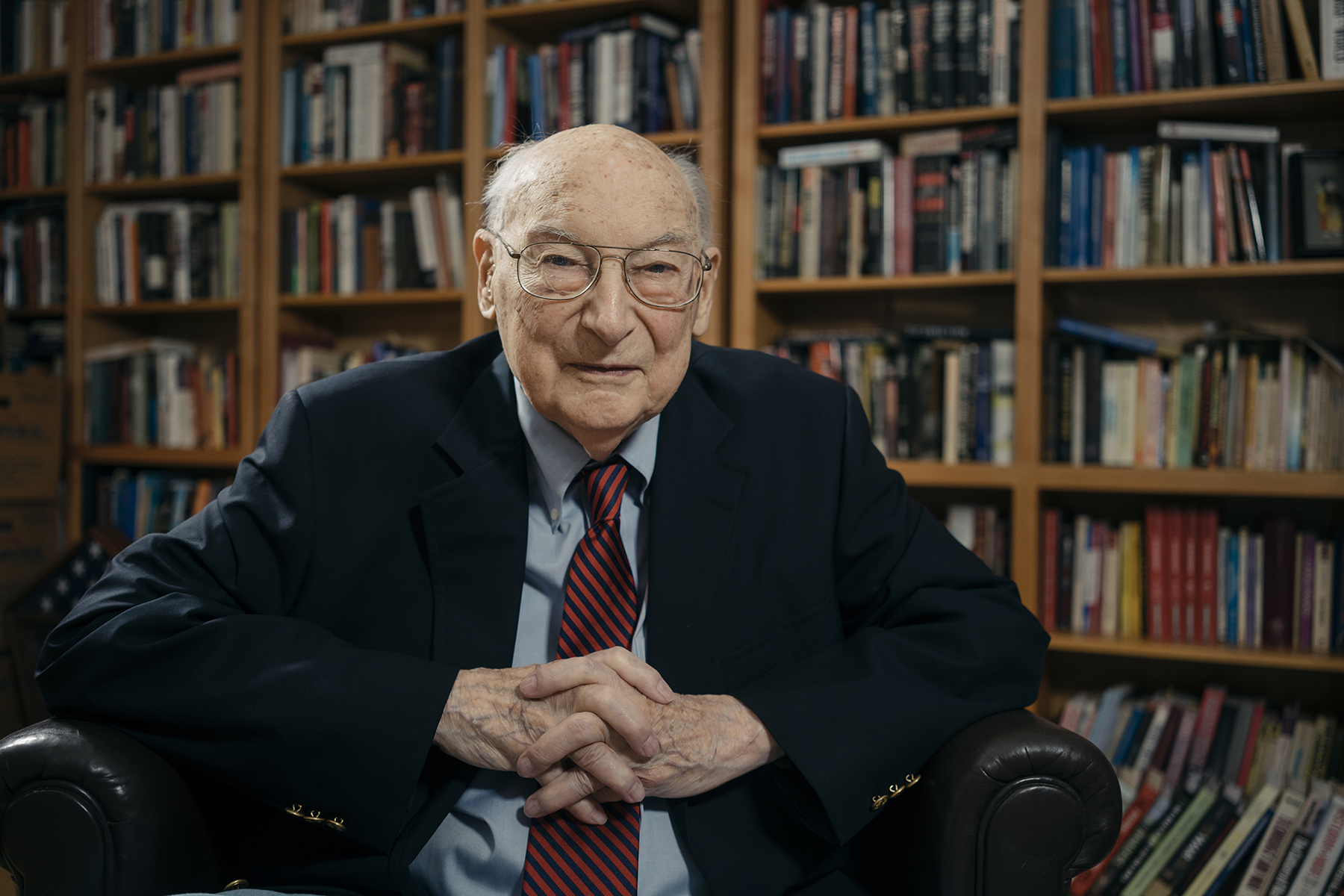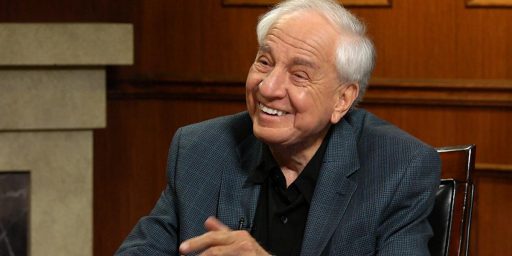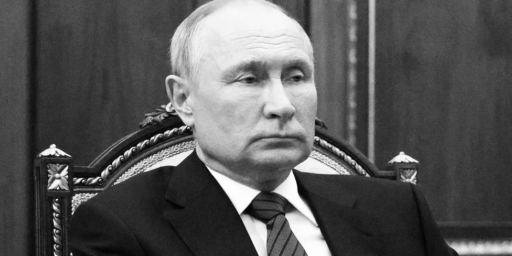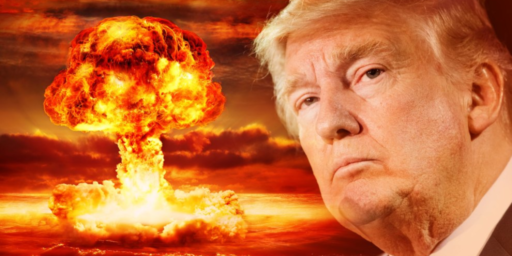Andrew Marshall Dead at 97
The legendary figure was in charge of strategic forecasting at the Pentagon for decades.

WaPo (“Andrew Marshall, Pentagon’s gnomic ‘Yoda’ of long-range planning, dies at 97“):
For more than 40 years, Andrew W. Marshall presided over a little-known office deep in the bowels of the Pentagon as the Defense Department’s designated deep thinker. A civilian scholar who had never served a day in uniform, he was charged with pondering the imponderable and with devising the country’s long-range strategies for fighting — and surviving — future wars.
Drawing on a variety of disciplines, from statistics and business management to nuclear physics, he was credited with foreseeing the collapse of the Soviet Union and with prodding reluctant U.S. leaders to adapt to changing military and technological needs.
Mr. Marshall, who guided the Defense Department’s Office of Net Assessment for 42 years, had access to the nation’s most sensitive intelligence secrets and worked directly for the secretary of defense. He was known for challenging established ways of thinking and for acquiring a reputation as the Pentagon’s “Yoda,” after the wise, gnomic Jedi master of “Star Wars.”
“He had an uncanny ability to pick out only the most significant questions, then to drill down deeply,” Michael Pillsbury, a colleague of 45 years, said in an interview. “He developed an iconoclastic, contrarian image.”
Mr. Marshall inspired such loyalty and near-reverent devotion that his former staffers called themselves graduates of “St. Andrew’s Prep.” He was 97 when he died March 26 at a hospice facility in Arlington, Va.
[…]
One reason Mr. Marshall was held in such esteem was his sheer longevity: He had been studying U.S. military strategy since 1949, at the beginning of the Cold War, and retired at 93 in 2015. He worked for years at the Rand Corp., a California think tank associated with the military, and had witnessed nuclear explosions in the 1950s before coming to the White House in 1969 as an aide to then-National Security Adviser Henry Kissinger.
In 1973, Secretary of Defense James R. Schlesinger, Mr. Marshall’s onetime colleague at Rand, created the Office of Net Assessment and put Mr. Marshall in charge. (The term “net assessment” derived from studies of nuclear war, including estimates of casualties and damage.)
“We tend to look at not very happy futures,” Mr. Marshall once told The Washington Post.
[…]
Mr. Marshall had a staff of only about 10 analysts, including military officers and civilians, working in windowless offices on the third floor of the Pentagon. They held the highest levels of security clearance.
“His approach was always to focus on the question,” McKitrick, a defense researcher who worked for Mr. Marshall in the 1980s, said in an interview. “Too often, people focus on solutions but haven’t identified the right questions. He thought it was very important to get the strategic questions right and then start thinking about the answers.”
Mr. Marshall received intelligence reports from the CIA and Defense Department and gauged future military needs against what he learned about U.S. adversaries.
“One of the things that happens from time to time ,” he told Armed Forces Journal in 2011, “is that you have to revise your entire notion of how your opponent sees things.”
During the Cold War, the conventional Pentagon thinking was that a Soviet nuclear attack would be aimed at major cities.
“We assumed the Soviets were like us and that they would like to destroy our cities,” Pillsbury said. “No, they wanted to destroy our command-and-control systems,” targeting military and political leaders.
As a result, billions of dollars were spent to strengthen emergency bunkers and to improve communications networks.
In the waning years of the Cold War, Mr. Marshall was among the first to suggest the Soviet Union’s crumbling infrastructure and failing economy foretold the country’s imminent collapse.
By then, Mr. Marshall had turned his attention in a different direction, following the adage that military leaders are always prepared to the fight the last war, not the next one. His view was that, as the world changed, the nature of warfare should change with it. In the 1990s, he recommended that military leaders shift their focus to China as the greatest long-term threat to U.S. preeminence.
In a 1993 memo called “Some Thoughts on Military Revolutions,” Mr. Marshall called for a “revolution in military affairs,” emphasizing a smaller, more mobile strike force and greater reliance on information technology. (Mr. Marshall did not use computers or email himself.)
During the administration of President George W. Bush, Defense Secretary Donald H. Rumsfeld called on Mr. Marshall to lead a comprehensive review of military readiness. Rumsfeld’s recommendation of a smaller, nimbler military came directly out of Mr. Marshall’s thinking.
Critics, however, noted that Mr. Marshall underestimated the social impact of the Internet and failed to anticipate the role of terrorism in the attacks of Sept. 11, 2001.
“You can never account for black swans, and 9/11 was a black swan,” McKitrick said. “There is a difference between predictions and forecasting.” Mr. Marshall, he added, “was about strategic forecasting.”
[…]
At the Rand Corp., his colleagues included futurist Herman Kahn — the best man at his wedding — and Daniel Ellsberg, who released the Pentagon Papers to news organizations, revealing the early history of the Vietnam War.
In those years, Mr. Marshall worked on early-warning systems and other ways to reduce the likelihood of nuclear attack.
[…]
Mr. Marshall’s office prepared more than 20 “net assessments” of future military strategies, each looking 10 to 20 years into the future. He delivered the reports by hand to the secretary of defense, carrying them in a zippered bag made of fireproof fabric. Only one copy was made of each report, which Mr. Marshall then kept locked in his office.
He is the only person known to have read all the reports, which remain classified to this day.
NYT (“Andrew Marshall, Pentagon’s Threat Expert, Dies at 97“) adds:
Mr. Marshall, as director of the Office of Net Assessment, was the secretive futurist of the Pentagon, a long-range thinker who both prodded and inspired secretaries of defense and high-level policymakers. Virtually unknown among the wider public, he came to be revered inside the Defense Department as a mysterious Yoda-like figure who embodied an exceptionally long institutional memory.
[…]
Through his many hires and generous Pentagon grants, estimated to total more than $400 million over four decades, Mr. Marshall trained a coterie of experts and strategists in Washington and beyond. One veteran of the office, Air Force Gen. Paul Selva, is now the vice chairman of the Joint Chiefs of Staff. Another, Robert O. Work, was the deputy secretary of defense from 2014 to 2017.
The exact nature of Mr. Marshall’s office was poorly understood. But he cultivated thinking that looked beyond the nation’s immediate problems and sought to press military leaders to approach long-term challenges differently.
“His gift was the framing of the question, the discovery of the critical question,” said Michael Pillsbury, a China expert who advised and worked with Mr. Marshall throughout his career. “He would always pick the least studied and most strategically significant subjects.”
[…]
Borrowing from business school theories of how corporations compete against each other, Mr. Marshall argued that nations are also in strategic competition with one another.
“His favorite example was if you can pit your strengths against someone else’s weakness and get them to respond in a way that makes them weaker and weaker, you can put them out of business without ever fighting,” said Henry Sokolski, a strategist who worked with Mr. Marshall.
Marshall was a legendary figure, although his legacy is not without controversy. The incredible secrecy attached to ONA’s work contributed to both, making him both a Yoda-like sage shrouded in mystery but also susceptible to the charge that they got a lot wrong. Sharon Weinberger‘s profile of him for Foreign Policy last September (“The Return of the Pentagon’s Yoda“) captures it nicely:
For his devoted acolytes, Marshall falls just short of an omniscient saint. To critics, Marshall is a neoconservative favorite who defended President Ronald Reagan’s quixotic missile defense system, hyped the threat from China, and won favor with scholars using the power of the Pentagon’s purse to fund their studies.
Regardless of how one judges Marshall’s contributions, he represents one of the last of a generation of defense intellectuals that included, on one end of the spectrum, the nuclear futurist Herman Kahn (who was the best man at Marshall’s wedding) and, at the other, the Pentagon Papers leaker Daniel Ellsberg who, before his fall from official grace, was also among Marshall’s circle of friends. Over the years, Donald Rumsfeld, Robert Gates, and Dick Cheney all turned to him regularly for advice.
Marshall got his start in national security at the Rand Corp. in 1949, collaborating with the analysts who defined nuclear strategy during the Cold War. Later, impressed with Marshall’s intellect, Henry Kissinger, then President Richard Nixon’s national security advisor, cajoled Marshall into leaving California for Washington to help assess the Soviets’ military capabilities. By 1973, Marshall was moved to the Pentagon, where he became the head of the newly established Office of Net Assessment. And there he stayed for 42 years, cultivating a group of disciples who called themselves members of “St. Andrew’s Prep.” By the 2000s, Marshall, then in his 80s, had earned the affectionate nickname Yoda.
Though he remained obscure to the public during much of his time in the Pentagon, Marshall achieved near-rock star status within national security circles for challenging bedrock assumptions of the intelligence and defense communities. One of Marshall’s most cited successes was his upending of Cold War assessments of the Soviet Union’s economic and military strength: Marshall argued that the CIA overestimated the Soviets’ GDP and then underestimated the percentage of GNP the country spent on its military. The Soviet economy, he insisted, was much smaller than believed and its military expenditures a bigger burden on it. He was right, and the CIA eventually revised its numbers.
Marshall, who advocated for the analysis of Soviet decision-making in terms of organizational behavior, was an even better master of understanding his own organization, the Pentagon. His ability to stay in his job through eight successive presidential administrations was a testament to his keen ability to maneuver within the Defense Department bureaucracy and Washington politics. When President Bill Clinton’s second defense secretary, William Cohen, tried to exile Marshall and his office to the National Defense University in 1997, legions of Marshall admirers swung into action, lobbying on Capitol Hill and making their case in the press. Marshall stayed put and doubled down on China, which he had long believed to be a potential threat to the United States.
Marshall emerged more publicly in 2001, when then-Defense Secretary Rumsfeld tapped him to help craft a key strategy document called the Quadrennial Defense Review (QDR). But just before the document was set to be released, members of al Qaeda—never a central concern for Marshall or his office—hijacked four planes, including one that slammed into the Pentagon. “Rumsfeld bought this vision [most notably on China], but 9/11 knocked everything off course,” said Aaron Friedberg, a Marshall protégé who is now a professor of politics at Princeton University.
The QDR had been mostly completed before 9/11; it had to be rejiggered, and language on counterterrorism was quickly inserted. As the wars in Afghanistan and Iraq ramped up, the Pentagon’s attention turned away from China. “But Andy didn’t get deflected,” Friedberg said. “The office continued to sponsor work on the maturing and emerging challenge from China.” Despite years of war, Marshall did not show much interest in counterinsurgency or terrorist groups. The Last Warrior—a 2015 biography of Marshall written by Andrew Krepinevich and Barry Watts, two of his intellectual progeny—makes only passing reference to 9/11 and its aftermath.
For Marshall, Afghanistan, Iraq, and the fight against terrorism were just distractions from greater threats posed by Russia and China. “I think our military is too busy with the ongoing warfare,” he told me. “That happened during the Vietnam War. You couldn’t get people in our military to pay attention to what the Russians were doing and what was happening in terms of their investment and new approaches in Central Europe.”
Marshall may not have been interested in counterinsurgency, but he paid attention to unconventional threats. Stephen Lukasik, who held senior positions at Rand and the Defense Department, worked on several studies for Marshall in recent years, including one that looked at a hypothetical private company that built and sold nuclear weapons. Yet even Lukasik, who praised Marshall for his sharp intellect, said cybersecurity was always a blind spot for the Pentagon’s futurist. The idea that the internet could transform national security challenges—whether through election meddling in the United States or a cyberattack against an industrial plant—has never been among his main concerns.
“Andy knew nothing and knows nothing about computers,” said Lukasik, whose proposal to study cybersecurity was dismissed by Marshall’s office.
For those in the Pentagon, including Lukasik, who were instrumental in bringing about the internet age, Marshall’s refusal to consider the implications of cyberwarfare and the global penetration of the internet was a rare moment of myopia for the director of net assessment.
For Marshall, the importance of information technology to national security isn’t online; it’s on the traditional battlefield. The Chinese, he believes, are studying military information operations to disrupt the enemy’s command and control capabilities as an area where they can gain a strategic advantage over the United States. He still laments that one of the last war games he planned to sponsor around 2014—involving China and information operations—never took place.
But even if the Pentagon, as Marshall argues, is late to the game, his decades of hammering away at the China threat have made their mark in a way that may ultimately be his most significant legacy. The Trump administration’s new National Defense Strategy, released in January, signaled a clear shift away from counterinsurgency back to great-power competition of the type Marshall has long emphasized. The document echoes a longtime Marshall theme, describing China as a “strategic competitor using predatory economics to intimidate its neighbors” while militarizing the waters and islands of the South China Sea.
Just acknowledging the threat isn’t enough for Marshall; he still believes that the Pentagon needs to do more to assess China’s military capabilities. “I would think, with respect to China, there would be underway an effort much like we had against the Soviet Union,” he said. “That would involve … as the work in the case of the Soviet Union did, a decade or more to begin to produce really first-rate analyses of particular warfare areas or theaters.”
The China issue is a classic case that could be argued both ways. It’s simply untrue that the Pentagon was too slow to identify China as a future threat. Indeed, it has been repeatedly touted as the “near-peer competitor” that we need to prepare against since the early 1990s–at a point when the PRC’s capabilities were a fraction of where they are now. But defense priorities have been split during the entirety of the post-Cold War period, with civilian decision-makers repeatedly drawn into minor conflicts and, since 9/11, a series of counterinsurgency and counterterrorism fights. Still, that’s mostly at the operational level—the Combatant Commands like CENTCOM—and below. At the enterprise level, the four services have always been investing what they could in the big fight. We didn’t build F-35s and Ford Class carriers to defeat the Taliban.
Insiders say Mr. Marshall was behind some of the key strategic decisions of the Reagan years. His strategy for a protracted nuclear war — based on weapons modernization, protection of governmental leaders from a first strike and an early version of Star Wars — effectively beggared the Soviet war machine. He advocated providing Afghan resistance fighters with the highly effective Stinger missiles. He tagged AIDS as a national security issue.
Supporters call Mr. Marshall ”iconoclastic” and ”delphic”; his detractors prefer ”paranoiac” or worse. No one has ever called him prolix. At a future-war seminar that he sponsored, Mr. Marshall mumbled a few introductory words and then sat in silence, eyebrows arched, arms folded, for the remaining two days. His only intervention came at the end. He suggested that when it came to the future, it would be better to err on the side of being unimaginative. After that experience, I better understood why he has been called the Pentagon’s Yoda.
Five years ago, I sought him out because of his legendary seven-page memo, ”Some Thoughts on Military Revolutions.” First circulated in August 1993, it promoted the ”revolution in military affairs,” a new movement in military analysis, in which information technologies combined with innovative military doctrine transform the nature of war.
My interview with Mr. Marshall took place in his paper-strewn Pentagon office. With one eye on the primitive rocket that stood between our chairs, I asked him about his current concerns. Even then Mr. Marshall saw Asia looming on the horizon. But his gaze was also directed backward, to Europe between the world wars. He had teams analyzing the failure of Great Britain, the leading power of the day, to formulate effective strategies of defense and deterrence from new technologies like the tank, airplane and radio. Relying on past glories, antiquated doctrine and international institutions like the League of Nations, Britain missed the revolution in military affairs of its day. Germany did not, and subdued most of Europe by blitzkrieg.
The rest may be history, but not for Andrew Marshall. In a time of great transformations, the interwar period shows what might happen if a ”peer competitor” gets the technological jump on a complacent United States. ”The 20’s,” he told me, ”turned out to be a period of illusion.”
Andrew Marshall is unusual in that he may have the power to make his vision of our enemies — whether illusionary or true — into reality. However, the horse-trading, pork-barreling, balkanizing process called ”defense policy making” has a way of chewing up grand visions, even when they are proclaimed by presidents.
A full assessment of Marshall’s acumen as a forecaster will be left to future scholars. Since the reports remain locked away from public view, few can really say at this point. It would be interesting, indeed, to look at the early reports—which surely don’t still need to be classified at this point—to see whether they accurately forecast the future threat environment. And to see whether inaccuracies in the forecasts led to wasting of resources or where recommendations not followed would have averted disaster.
In the end, of course, strategic forecasting is a mug’s game. There are simply too many variables to accurately paint a picture of the world ten years out, much less twenty or thirty. But, given the nature of our budgeting and defense infrastructure, it’s imperative to try. That Marshall plugged along for decades, retaining the confidence of Defense Secretary after Defense Secretary, is a testament that those at the top though putting our future in his hands was our best hope.





